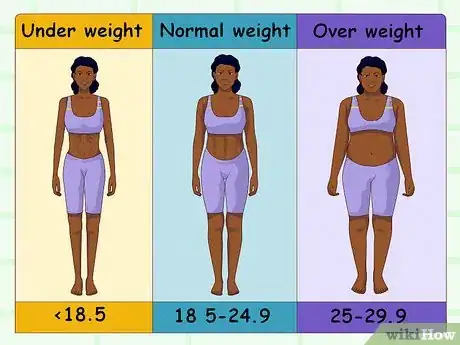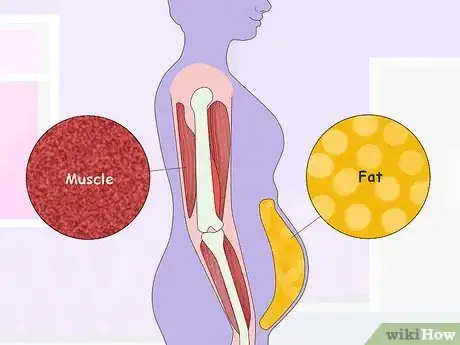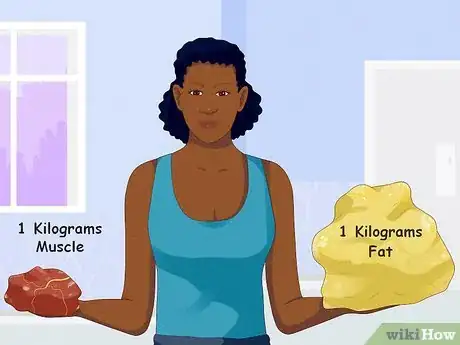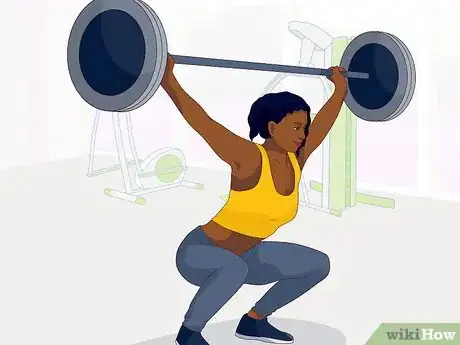This article was co-authored by Eric Martinez and by wikiHow staff writer, Eric McClure. Eric Martinez is a Registered Clinical Exercise Physiologist and the Vice President of Infinity Sports Institute in Miami, Florida. With over a decade of experience, Eric specializes in clinical exercise physiology, human optimization, and sports science. He works with professional and Olympic athletes as well as high-risk patients. Eric holds an MS in Exercise Physiology from Barry University and is a Registered Clinical Exercise Physiologists in the State of Florida. Eric holds 15 different certifications in specialties such as strength and conditioning, injury prevention, neuro biomechanics, and Kinesio taping. He trains hundreds of coaches in Nero and Clinical Physiology certifications.
There are 26 references cited in this article, which can be found at the bottom of the page.
This article has been viewed 19,053 times.
In the age of fad diets and breaking headlines about contradicting medical studies, it can be hard to know what “healthy” even means anymore. If you’re curious about whether you’re carrying an appropriate amount of weight for your size, look no further than your body-mass index, or BMI. Your BMI numbers will give you a pretty good idea if you’re within a normal weight range for your height. If it turns out you are a little overweight, work with your doctor to develop a diet and exercise plan that will help you shed a few pounds.
Steps
What is obese for my height?
-
1The best way to tell if weight is appropriate for your height is to check your body-mass index, or BMI. This is your weight in kilograms, divided by the square of your height in meters.[1] Your BMI doesn’t measure your body fat or metabolism, so it doesn’t tell you if you’re healthy or not, but it does paint a pretty accurate picture of whether you’re overweight or not.[2]
-
2Use a BMI calculator to find out if you’re overweight or obese. Hop online and pull up a BMI calculator from a reputable site. Set the calculator to metric or imperial measurements depending on which system you prefer. Enter your height and weight. Then, let the calculator do the work for you to find your BMI.[5]
- The Center for Disease Control and Prevention has an easy-to-use BMI calculator. You can find it here: https://www.cdc.gov/healthyweight/assessing/bmi/adult_bmi/english_bmi_calculator/bmi_calculator.html
- If your BMI is 18.5 or lower, you are considered underweight.[6]
- When your BMI is 18.5-24.9, you are considered normal/healthy for your height.[7]
- A BMI of 25-29.9 means you are overweight (but not obese).[8]
- If your BMI is over 30, you are considered obese.[9] Anything over 40 is considered morbidly obese.[10]
Do thin people live longer?
-
1It depends on how thin you are, but you’re more likely to live long if you have a normal BMI.[11] One study from the New England Journal of Medicine analyzed data from 1.5 million Americans. They found that the people with a normal BMI (20-24.9) were more likely to live longer, while people with a morbidly obese BMI (40 or higher) were 2.5 times more likely to pass prematurely.[12]
- Your BMI isn’t the only thing contributing to your lifespan. If you want to live a long, healthy life, your diet and lifestyle are extremely important. Eat more vegetables, consume smaller meals, exercise, and don’t smoke if you want to stay healthy![13]
-
2You can still live a long life if you’re carrying a few extra pounds. There were some big headlines a few years ago that suggested people that are slightly overweight may live slightly longer (about 6% longer). This is known as the “obesity paradox” among medical professionals, and there are various theories on this. While some data may indicate that it’s not a big deal if you’re carrying a little extra weight, you’re still better off maintaining a lower weight so long as your BMI is within normal ranges.
- One possible explanation for the obesity paradox is that people with a little extra weight survive longer if they lose weight due to illness.
- Another explanation is that doctors tend to pay more attention to certain risk factors when their patients are a little overweight so they catch potential problems faster.
Is it OK to be slightly overweight?
-
1In general, it’s better to be within a normal weight range.[14] While it’s probably fine to be slightly overweight, most people gain weight as they get older. This means you’re more likely to become obese over time if you’re overweight.[15] Obesity increases your risk of heart disease, diabetes, and even cancer.[16] If you’re overweight, work on eating smaller portions and exercising regularly to get back to a healthy weight.[17]
- Focus on building healthy habits to improve over time. Once your BMI is 18-24.9, you’re right where you should be![18]
-
2Where you’re carrying extra weight matters a lot. There’s a big difference between a body builder carrying a few extra pounds on their biceps and the average person carrying some extra weight on their stomach.[19] Visceral fat, which is stored around your waist and stomach, is considered much more detrimental than fat you carry elsewhere on your body.[20] A large amount of belly fat increases your risk for a variety of cardiovascular diseases and cancers.[21]
- Keep in mind, the negative impacts of carrying extra weight are reversible. If you’re overweight and you shed a few pounds, you’ll be fine.[22]
How do you know if it's water weight or fat?
-
1Most of your weight is water to begin with! After your bones, water is the heaviest thing in your body.[23] If you start to lose weight or you eat a caloric deficit (where you burn more calories than you consume), most of the weight you initially lose will be water weight.[24] There’s no way to tell if it’s water weight or not without losing the weight, though.
- You retain water weight more easily when you’re obese. The good news is that this weight will be easier to lose if you start shedding a few pounds![25]
-
2Drinking more water will actually help you lose weight.[26] The more hydrated you are, the more efficient your body will be when it comes to burning fat. In addition, drinking water will make you less hungry, so you’ll consume fewer calories. Staying hydrated will also boost your metabolism, which will make it easier to work out.[27]
- One study suggests that drinking 16.9 fluid ounces (500 mL) of water 3 times a day will really help you shed some weight.[28]
Which is heavier muscle or fat?
-
1Muscle is much denser than fat.[29] This means that fat will take up more volume than muscle, but 1 pound (0.45 kg) of muscle weighs just as much as 1 pound (0.45 kg) of fat. Saying muscle is “heavier” isn’t necessarily correct, though.[30]
- In other words, picture how much space 1 pound (0.45 kg) of marshmallows would take up. Now, picture 1 pound (0.45 kg) of metal. This is the difference between fat and muscle.[31]
-
2You should still build muscle if you’re trying to lose weight. Adding to your “muscle weight” is a good thing if your goal is to get fit, even if muscle is more dense than fat. You build muscle by working out and being active, which means you’re burning calories.[32] If you can burn more calories than you consume by eating healthy and working out, you’re going to lose weight over time. Don’t worry about building muscle—this is a good thing![33]
- When you burn more calories than you take in, it’s known as a caloric deficit. The best way to lose weight is to eat healthy and exercise while maintaining this deficit. Once you’re in a healthy weight range, eat enough calories and exercise regularly enough to hold that weight.[34]
Is being too muscular unhealthy?
-
1Not really, although there haven’t been a lot of studies on this subject. So long as your BMI stays in the normal range, you’re probably fine even if you’ve built a lot of muscle.[35] Even if you do a ton of strength training and your BMI goes beyond the normal range, you can still be considered healthy.[36] The benefits of regular weight training just simply outweigh any potential downsides.[37]
- It’s important to note that you shouldn’t be hyper-obsessed with building your muscles. You should focus on living a healthy lifestyle, not getting huge muscles![38]
-
2Talk to your doctor if you’re building muscle and you’re worried about your weight.[39] Your BMI alone isn’t enough to paint the full picture, so talk to your primary care doctor if you’re worried about your muscles being unhealthy. Only a trained medical professional can determine whether you’re too muscular or not.[40]
- If you’re taking dangerous supplements, starving yourself, or taking drugs to build muscle, you aren’t living a healthy lifestyle.[41] If you’re just getting pumped at the gym a few days a week and you aren’t obsessing over it, you’re probably fine.
Expert Q&A
-
QuestionAre there any problems with BMI? My BMI says I'm slightly overweight but I look skinny.
 Eric MartinezEric Martinez is a Registered Clinical Exercise Physiologist and the Vice President of Infinity Sports Institute in Miami, Florida. With over a decade of experience, Eric specializes in clinical exercise physiology, human optimization, and sports science. He works with professional and Olympic athletes as well as high-risk patients. Eric holds an MS in Exercise Physiology from Barry University and is a Registered Clinical Exercise Physiologists in the State of Florida. Eric holds 15 different certifications in specialties such as strength and conditioning, injury prevention, neuro biomechanics, and Kinesio taping. He trains hundreds of coaches in Nero and Clinical Physiology certifications.
Eric MartinezEric Martinez is a Registered Clinical Exercise Physiologist and the Vice President of Infinity Sports Institute in Miami, Florida. With over a decade of experience, Eric specializes in clinical exercise physiology, human optimization, and sports science. He works with professional and Olympic athletes as well as high-risk patients. Eric holds an MS in Exercise Physiology from Barry University and is a Registered Clinical Exercise Physiologists in the State of Florida. Eric holds 15 different certifications in specialties such as strength and conditioning, injury prevention, neuro biomechanics, and Kinesio taping. He trains hundreds of coaches in Nero and Clinical Physiology certifications.
Clinical Performance Specialist & Registered Clinical Exercise Physiologist Clinical Performance Specialist & Registered Clinical Exercise PhysiologistExpert AnswerThere absolutely are some things that BMI leaves out, and it's certainly possible to have a higher or lower BMI than you theoretically should. BMI doesn't take things like body mass, bone density, or muscle into account. If you look and feel healthy, it's not something you need to worry about.
Clinical Performance Specialist & Registered Clinical Exercise PhysiologistExpert AnswerThere absolutely are some things that BMI leaves out, and it's certainly possible to have a higher or lower BMI than you theoretically should. BMI doesn't take things like body mass, bone density, or muscle into account. If you look and feel healthy, it's not something you need to worry about. -
QuestionAre there any better ways to measure ideal weight besides BMI?
 Eric MartinezEric Martinez is a Registered Clinical Exercise Physiologist and the Vice President of Infinity Sports Institute in Miami, Florida. With over a decade of experience, Eric specializes in clinical exercise physiology, human optimization, and sports science. He works with professional and Olympic athletes as well as high-risk patients. Eric holds an MS in Exercise Physiology from Barry University and is a Registered Clinical Exercise Physiologists in the State of Florida. Eric holds 15 different certifications in specialties such as strength and conditioning, injury prevention, neuro biomechanics, and Kinesio taping. He trains hundreds of coaches in Nero and Clinical Physiology certifications.
Eric MartinezEric Martinez is a Registered Clinical Exercise Physiologist and the Vice President of Infinity Sports Institute in Miami, Florida. With over a decade of experience, Eric specializes in clinical exercise physiology, human optimization, and sports science. He works with professional and Olympic athletes as well as high-risk patients. Eric holds an MS in Exercise Physiology from Barry University and is a Registered Clinical Exercise Physiologists in the State of Florida. Eric holds 15 different certifications in specialties such as strength and conditioning, injury prevention, neuro biomechanics, and Kinesio taping. He trains hundreds of coaches in Nero and Clinical Physiology certifications.
Clinical Performance Specialist & Registered Clinical Exercise Physiologist Clinical Performance Specialist & Registered Clinical Exercise PhysiologistExpert AnswerYes, you can get a dexa scan to see how much body fat you have. That's probably a good option if you've naturally got a bigger frame or you work out a lot, since your BMI may be a little skewed in that case.
Clinical Performance Specialist & Registered Clinical Exercise PhysiologistExpert AnswerYes, you can get a dexa scan to see how much body fat you have. That's probably a good option if you've naturally got a bigger frame or you work out a lot, since your BMI may be a little skewed in that case.
References
- ↑ https://www.cdc.gov/healthyweight/assessing/bmi/adult_bmi/index.html
- ↑ https://www.cdc.gov/healthyweight/assessing/bmi/adult_bmi/index.html
- ↑ https://www.rush.edu/health-wellness/quick-guides/what-is-a-healthy-weight
- ↑ https://www.ncbi.nlm.nih.gov/pmc/articles/PMC4890841/
- ↑ https://www.cdc.gov/healthyweight/assessing/bmi/adult_bmi/english_bmi_calculator/bmi_calculator.html
- ↑ https://www.cdc.gov/healthyweight/assessing/bmi/adult_bmi/index.html#Interpreted
- ↑ https://www.cdc.gov/healthyweight/assessing/bmi/adult_bmi/index.html#Interpreted
- ↑ https://www.cdc.gov/healthyweight/assessing/bmi/adult_bmi/index.html#Interpreted
- ↑ https://www.cdc.gov/healthyweight/assessing/bmi/adult_bmi/index.html#Interpreted
- ↑ https://www.health.harvard.edu/heart-health/stay-lean-live-longer
- ↑ https://www.ncbi.nlm.nih.gov/pmc/articles/PMC5418561/
- ↑ https://www.health.harvard.edu/heart-health/stay-lean-live-longer
- ↑ https://pubmed.ncbi.nlm.nih.gov/12591555/
- ↑ https://www.ncbi.nlm.nih.gov/pmc/articles/PMC5418561/
- ↑ https://www.health.harvard.edu/staying-healthy/exercise-and-aging-can-you-walk-away-from-father-time
- ↑ https://www.hsph.harvard.edu/obesity-prevention-source/obesity-consequences/health-effects/
- ↑ https://www.hsph.harvard.edu/nutritionsource/healthy-weight/
- ↑ https://www.cdc.gov/healthyweight/assessing/bmi/adult_bmi/index.html#Interpreted
- ↑ Eric Martinez. Clinical Performance Specialist & Registered Clinical Exercise Physiologist. Expert Interview. 18 May 2021.
- ↑ https://www.health.harvard.edu/staying-healthy/can-you-be-overweight-and-still-be-fit
- ↑ https://www.mayoclinic.org/healthy-lifestyle/mens-health/in-depth/belly-fat/art-20045685
- ↑ https://www.health.harvard.edu/staying-healthy/can-you-be-overweight-and-still-be-fit
- ↑ https://vitalrecord.tamhsc.edu/you-asked-what-is-water-weight/
- ↑ https://vitalrecord.tamhsc.edu/you-asked-what-is-water-weight/
- ↑ https://vitalrecord.tamhsc.edu/you-asked-what-is-water-weight/
- ↑ https://www.ncbi.nlm.nih.gov/pmc/articles/PMC4121911/
- ↑ https://hub.jhu.edu/at-work/2020/01/15/focus-on-wellness-drinking-more-water/
- ↑ https://www.ncbi.nlm.nih.gov/pmc/articles/PMC4121911/
- ↑ https://www.health.harvard.edu/blog/overweight-and-healthy-the-concept-of-metabolically-healthy-obesity-201309246697
- ↑ https://blogs.bcm.edu/2016/01/20/dispelling-nutrition-myths/
- ↑ https://www.bcm.edu/news/muscle-doesnt-weigh-more-than-fat
- ↑ https://blogs.bcm.edu/2016/01/20/dispelling-nutrition-myths/
- ↑ https://www.health.harvard.edu/should-you-weigh-yourself-every-day
- ↑ https://academiccommons.columbia.edu/doi/10.7916/D8SJ1KV9
- ↑ https://www.ncbi.nlm.nih.gov/books/NBK535456/
- ↑ https://www.health.harvard.edu/blog/overweight-and-healthy-the-concept-of-metabolically-healthy-obesity-201309246697
- ↑ https://www.health.harvard.edu/staying-healthy/strength-training-builds-more-than-muscles
- ↑ https://bearworks.missouristate.edu/cgi/viewcontent.cgi?article=4149&context=theses
- ↑ https://www.rush.edu/health-wellness/quick-guides/what-is-a-healthy-weight
- ↑ Eric Martinez. Clinical Performance Specialist & Registered Clinical Exercise Physiologist. Expert Interview. 18 May 2021.
- ↑ https://www.abc.net.au/news/health/2019-05-01/bodybuilding-health-effects-dehydration-starvation-hormones/10971608































































